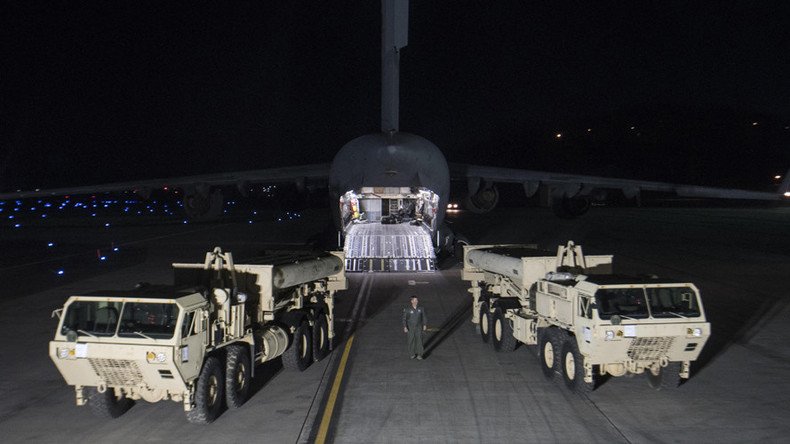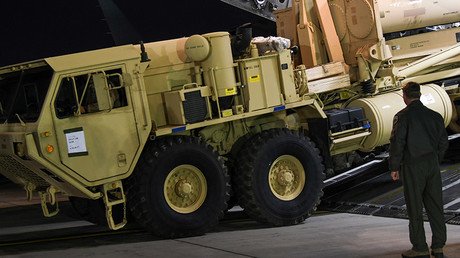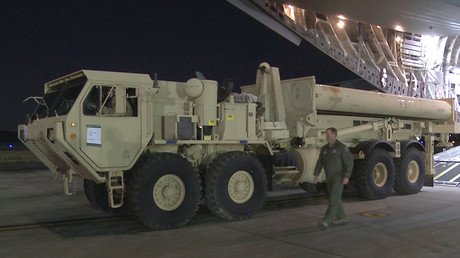THAAD deployment to S. Korea undermines region’s strategic security – Chinese president

The deployment of the US THAAD anti-missile systems in South Korea undermines security on the Korean peninsula and in the entire region while contributing nothing to the process of denuclearization of North Korea, China’s President Xi Jinping said.
“The deployment of the US THAAD missile defense system in South Korea does serious damage to the strategic security interests of all countries in the region, including China and Russia, and disrupts the regional strategic balance,” Xi warned ahead of his visit to Moscow in an interview with TASS news agency and the Rossiyskya Gazeta daily.
The Chinese president also said that this move would not help denuclearize Pyongyang in any way and would by no means contribute to maintaining stability and peace in the region as it would only provoke further tensions. He added that Beijing already repeatedly expressed its deep concern over this issue.
Moscow and Beijing have a “similar view on the nature of the THAAD deployment and its negative impact” on the situation in the region, the Chinese leader also said, adding that the two countries maintain a close cooperation in dealing with this security problem.
“Russia and China would take adequate measures to ensure their national security and strategic balance in the region both in cooperation with each other and on their own,” Xi told the Russian media.
He then once again called on the “relevant parties to stop THAAD deployment to the Republic of Korea and back away from this decision,” apparently addressing the US and Korean leadership.
The Chinese leader also said that the crisis on the Korean Peninsula should be resolved only through dialogue that would take into account the “reasonable concerns” of all parties involved. He then suggested using a “two-track approach” that would involve both gradual nuclear disarmament of North Korea and cessation of the massive joint US-South Korean drills in the region.
‘THAAD out, Peace in’: S. Koreans protest US missile deployment ahead of Trump talks https://t.co/AKK6hCsRb6
— RT (@RT_com) June 24, 2017
China has repeatedly expressed its opposition to the THAAD deployment in South Korea. In early June, it said it was “gravely concerned” by reports that four extra THAAD launchers were delivered to South Korea.
The THAAD battery sent to South Korea was equipped with two launchers out of a maximum capacity of six when it was deployed in March. The stealthy delivery of the additional four launchers brings the system up to full strength.
South Korean President Moon Jae-in, who assumed office in May, even ordered a probe into his country’s Defense Ministry after it was revealed that it had “intentionally dropped the introduction of four more (THAAD) launchers [from] its report.”
However, he also told visiting US Senator Dick Durbin on Wednesday that the Defense Ministry probe was a “purely a domestic measure,” which was “not about trying to change the existing decision or sending a message to the US,” and even sent his top security aide to Washington to reassure the US authorities that THAAD won’t be scrapped.
Beijing remains unconvinced that THAAD (Terminal High Altitude Area Defense) is needed to protect South Korea from a potential nuclear threat posed by the North, the US claims. However, China believes it highly likely that the Americans will use the anti-missile system’s powerful radar to monitor its military activities.
On June 1, China urged the US to pull the THAAD system out of South Korea, following the reports of its secret deployment. Russia shares China’s worries about the presence of a US anti-missile system in South Korea. In June, Russian President Vladimir Putin said that Russia will not leave this move without response, explaining Russia’s own military build-up in the region.
“This issue is a major concern for us and we have been constantly voicing it for decades. This disrupts the strategic balance in the world. But the world is silent and nobody listens to us,” Putin said at that time.














